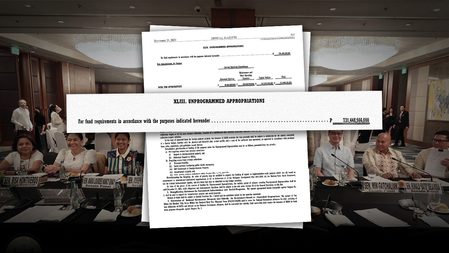SUMMARY
This is AI generated summarization, which may have errors. For context, always refer to the full article.
![[New School] Opening closed doors: Why full disclosure on congressional insertions matter](https://www.rappler.com/tachyon/2024/02/20240214-full-disclosure-congressional-insertions-matter.jpg)
For over a decade, there has been a persistent demand for complete transparency regarding congressional insertions in budget deliberations, initially advocated by Senator Mar Roxas and Miriam Defensor-Santiago through their own proposed legislations. While it is crucial to prioritize the constitutional right of Filipinos to access information on matters of public concern, including how their taxes are to be utilized through the national appropriations, it is regrettable that no progress has been made on this front since then.
“Congressional insertions” refer to any amendments made by a member or committee of either chamber of Congress during budget deliberations on the General Appropriations Bill (GAB). These insertions can occur not only during the individual chamber’s deliberations but also during the bicameral conference committee meetings. Following the passage of their own versions of the GAB through the third and final reading, both chambers of Congress appoint members to form a bicameral conference committee. This committee convenes to address and reconcile disparities in the GAB provisions between the two, including but not limited to modifications and insertions, before the Congress’ approval, and thereafter, the transmission of the “harmonized” version to the President.
It is worth noting that congressional insertions primarily occur during the bicameral conference. However, it has been a longstanding practice for this process to occur behind closed doors, which potentially jeopardizes the transparency and integrity of the budget process. This is in contrast to the budget deliberations done within individual chambers, which are typically accessible through their respective official websites and social media platforms. This accessibility enables us to closely observe the amendments integrated into the budget bill.
Furthermore, democratic governance should also be given primacy in the budgetary process. While the Constitution grants Congress the power of the purse (or its authority to legislate government expenditures and determine where funds are allocated), it is crucial to highlight that elected officials should act as representatives of the people in such matters. Therefore, in the process of budgetary appropriation, any insertions made by the Congress should prioritize the interests of the people and be made accessible for public scrutiny.
It should also be noted that the most significant and potentially final insertions are made to the bill during the bicameral conference. In this regard, these sessions should really be made available for public viewing. Allowing this to occur unchecked could empower legislators in the committee to insert amounts or items that serve their own interests, leading to potential conflicts.
For instance, during the bicameral conference for the 2023 GAB, the Senate’s reduction of the Department of Education’s (DepEd) confidential funds (CFs) to P30 million was reversed, restoring it to its original amount of P150 million. This decision stirred controversy regarding the necessity of these funds, especially considering that other funds for social services previously slashed were not reinstated. Fortunately, during the bicameral deliberations for the 2024 GAB, the usage of such funds for the department was questioned, resulting in no restoration of CFs in the DepEd’s budget.
It is vital to acknowledge that the budget discussed in the bicameral conference committee involves public funds, making it a matter of great concern to the public. Therefore, the public not only has the right, but also the responsibility to know and observe how their own funds are being utilized. With this understanding, there is an urgent need to enact a full disclosure act on congressional insertions, as advocated for by former senators. Additionally, it is essential to ensure the recording or streaming of the entire budgetary proceedings of the bicameral committee.
Besides the aforementioned, Senate Bill No. 2623, introduced during the 14th Congress by Mar Roxas, known as the Congressional Insertions Transparency Act of 2008, also mandates comprehensive disclosure of all insertions to any requesting individual or group. Subsequently, upon approval of the General Appropriations Act (GAA), a report outlining “all” congressional insertions, whether or not contained in the act, must be published on the official websites of both chambers, and in two nationally circulated newspapers.
Seemingly, this bill appears to advocate for good governance in the budgetary process. But given that its implementation would significantly restrict pork barrel activities (or the utilization of public funds for projects aimed at appeasing voters or lawmakers and securing votes), this is something that the Congress would not easily approve of. After all, it seems that these practices of some or most lawmakers often outweigh their commitment to transparency and accountability.
During the bicameral conference for the 2024 GAB, for instance, the committee introduced additional funds without the consent of the broader membership of the Congress, leading opposition lawmakers to contend that the surge in unprogrammed funds (or standby funds used for emergency situations or unforeseen expenses) was made with “grave abuse of discretion.”
For context: the 2024 GAA signed by the president reveals an increase in unprogrammed funds for 2024, totaling P731 billion. This amount exceeds the initial request made by the executive branch to Congress by P450 billion. Consequently, the three lawmakers have recently filed a petition with the Supreme Court, seeking to challenge the constitutionality of the purported excess in unprogrammed funds in the GAA.
Why the increase? It is something only they will know.
It is, nonetheless, clearly stated in Article VI, Section 25(1) of the Constitution that “the Congress may not increase the appropriations recommended by the President for the operation of the Government as specified in the budget.” Hence, the move by the bicameral committee in its insertion of unprogrammed funds definitely raises significant legal concerns and demands scrutiny from the judiciary.
With all these, it prompts us to ponder: “Is public office STILL a public trust?” or “Is it merely a guise for public officials’ own interests?”
Ensuring full transparency on congressional insertions, particularly concerning the national budget and public expenditure, is of utmost importance. This transparency is crucial as it determines the allocation of funds for various public programs, projects, and services throughout the entire fiscal year. Ultimately, promoting transparency in the budgetary process is not merely a choice but a necessity. This commitment should ensure that our national budget is not swayed by the government’s self-serving agendas, but instead, reflects the authentic needs and interests of the Filipino people. – Rappler.com
Fidel Louis Ceñidoza is a graduating student of Bachelor of Public Administration from the University of the Philippines Diliman-National College of Public Administration and Governance (UP NCPAG).
Add a comment
How does this make you feel?


There are no comments yet. Add your comment to start the conversation.